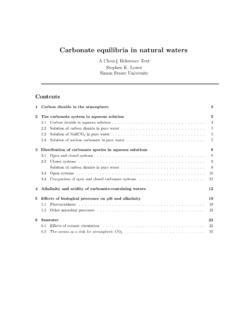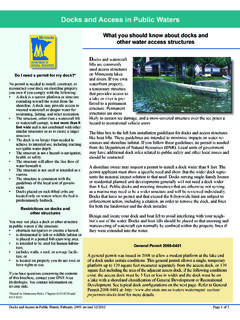Transcription of Law Enforcement Division PUBLIC RIGHTS ON MICHIGAN …
1 IvLaw Enforcement Division PUBLIC RIGHTS ON MICHIGAN WATERS MICHIGAN CONSTITUTION The State of MICHIGAN is entrusted with protecting the natural resources of the state and its citizens through a specific provision within the MICHIGAN Constitution. The conservation and development of the natural resources of the state are hereby declared to be of paramount PUBLIC concern in the interest of the health, safety and general welfare of the people. The legislature shall provide for the protection of the air, water and other natural resources of the state from pollution, impairment and destruction. Mich. Constitution, Art IV, 52. The State is compelled to act to uphold and advance this constitutional provision. vINTRODUCTION The State of MICHIGAN is surrounded by four of the five Great Lakes--the world's largest freshwater lakes. These Great Lakes constitute 90% of the country's fresh surface water , and about 20% of the world's fresh surface water .
2 The Great Lakes are resources of vital national importance; utilized for manufacturing, shipping, drinking, recreation, and tourism. MICHIGAN has approximately 3,288 miles of Great Lakes coastline, more than 10,000 inland lakes and ponds and is interwoven by a 35,000-mile web of freshwater rivers, streams, and wetlands. Accordingly, MICHIGAN has more boat registrations than any other state in the country. It comes then as no surprise that disputes arise between those who wish to utilize these waters and those who own private land through which these waters flow. The following document is offered as a guide to how water RIGHTS came to be and the current state of the law. This information has been compiled for convenience in answering common questions regarding water law in the State of MICHIGAN . This material highlights the evolution of court decisions and legislative enactments dealing with water and related legal issues.
3 The manual discusses the court's role in defining and shaping MICHIGAN water law. The "floating log test," the "recreation-boating test" and other terms pertinent to water law are discussed and defined. The text also provides an overview of the applicable statutes enacted by the MICHIGAN Legislature. A list of common questions and their answers has been included to provide easily accessible information regarding situations of frequent interest and discussion. MICHIGAN 's waters support numerous activities and uses. It is therefore imperative to discuss these uses as they relate to and interact with areas of water law. Accordingly, not only water , but such ancillary issues as fishing, boating, hunting, trapping, ownership, access, development and their related RIGHTS are discussed in varying detail. The field of water law is complex and develops periodically through both legislative and judicial action.
4 This manual is not, nor is it meant to be, an exhaustive or conclusive evaluation of the issue. This material is designed to provide the reader with a working knowledge and understanding of this complicated yet interesting area of MICHIGAN law. This material was first compiled as Law Enforcement Division Report No. 9. The authors were Mr. Frank Opolka of the Law Enforcement Division and Mr. John F. Leone, a student intern from the Thomas M. Cooley Law School. Mr. Opolka is now retired. Mr. Leone is currently an Assistant Attorney General for the State of MICHIGAN . The material in this report related to the status of water law in MICHIGAN was updated on December 1, 1993, through the diligent efforts of Stephen L. Madkour, Thomas M. Cooley Law School. The report was editorially updated in April, 1997. 4 THE BIRTH AND HISTORICAL DEVELOPMENT OF water RIGHTS Primitive man's existence was primarily dependent upon game and fish.
5 From the beginning of recorded history, kings and sovereigns, being the strongest power in the land, owned the game and fish as they owned all property. They were their own Enforcement agents in protecting their RIGHTS . When William the Conqueror imposed his rule upon England in the year 1066, the concept that all property was vested in the king crossed the English Channel. In 1215, King John of England surrendered many of the kingly prerogatives to his barons and nobles. Present concepts of land ownership and property RIGHTS in game and fish have their beginnings in this action. With the American Revolution, the colonies confiscated the English crown property and many crown grants. By the Acts of Confederation, the ownership of land was ceded to the Federal Government. Virginia, New York, Maryland and Connecticut had claims to lands of the Northwest Territory. Virginia's claim to the MICHIGAN area seems to have been the strongest, which may explain frequent references in the record of territorial jurisprudence to Virginia procedure, and interpretation to the common law of England.
6 At the close of the Revolutionary War, certain crown grants, including a few from the King of France, were recognized and patents were issued by the Federal Government. Grants of land were made as military bounty warrants to soldiers and sailors. The United States later established a definite land policy and large areas were conveyed to colonizers. These new owners displaced the sovereign, however they did not acquire ownership of the game and fish which passed to the states. Game and fish, being migratory in their habits, disregard property boundaries and pass over the lands of many owners. If all land were owned by the state, the problem would be simple. The landowner is conceded to have exclusive RIGHTS in the taking of game, either by hunting or trapping, upon his or her own property and in open seasons. This right, being a property right originating in ownership of land, may be sold or transferred.
7 Thus, one may own the land but sell the right to take game. A parallel is the sale of mineral RIGHTS by the landowner who may continue to occupy and use the land, while mining by others is in progress. MICHIGAN 'S HISTORICAL DEVELOPMENT In MICHIGAN , riparian owners on inland waters historically had title to the land under the water . It was, therefore, necessary to provide a legal avenue in which to convey RIGHTS to provide PUBLIC fishing over private lands. The source of this right in MICHIGAN is unique in that it is dependent in many instances upon the question of navigability of the water . Under the English system, fishing RIGHTS could be a common right of all and also limited or restricted, as the privilege was acquired by prescription, grant or land ownership. 5 Thus, the English common law does not govern the taking of fish as it governs the taking of game.
8 water is like air, owned by no one and yet owned by all. Therefore, no one can claim an exclusive right to take fish on the basis of water ownership. In MICHIGAN , the right to take fish is shared by all, provided the water in which they are taken is PUBLIC . Under the law of this state, although the riparian owner on an inland lake or stream owns the soil under the water , he does not own the navigable water , and he does not own the fish. So far as they are capable of ownership, they belong to the state for the benefit of the people. By judicial decision in 1860, the title to the beds of inland navigable waters, both lakes and streams, was declared to be in the riparian owners. The title, allowed to be taken by the riparian owners, was subordinate to PUBLIC RIGHTS , including the PUBLIC right of fishing. In contrast, the title to bottomlands of the Great Lakes is held in trust by the State of MICHIGAN .
9 For purpose of clarification, a riparian owner is simply one who owns land or property abutting water . Actually, a riparian is one who owns land contiguous to a river or stream, and one who owns lands contiguous to a lake is properly called a littoral owner. But in common practice, both are referred to as riparians. The question is often asked: How did the State of MICHIGAN acquire the duty to hold the soil beneath navigable waters in trust for PUBLIC use? Virginia ceded the Northwest Territory to the Federal Government. MICHIGAN , which was carved from this territory, took title to the submerged lands limited to the grant by Virginia and the Ordinance of 1787. This ordinance, being one of the laws of the Northwest Territory, and still of binding force in MICHIGAN , provided that "[t]he navigable waters leading into the Mississippi and the Saint Lawrence, and the carrying places between, shall be common highways, and forever free.
10 Without any tax, impost, or duty therefor." Art. IV Northwest Ordinance 1787. Therefore, MICHIGAN , upon admission to the Union, took title burdened with the aforesaid PUBLIC trust. MICHIGAN , either by legislative enactment or judicial decision, could in turn, surrender title to its submerged lands. The State, by judicial fiat in the case of Lorman v Benson, 8 Mich. 18 (1860), retained title to the bed of the Great Lakes, but surrendered title of the submerged soil of inland navigable waters to riparian owners. However, this transfer of title could not unburden such submerged land from the PUBLIC right of navigation, fishing, and related uses as the State of MICHIGAN could not convey to a private individual more RIGHTS than it originally took. It is significant that the title, which the state took to all navigable waters, was burdened with the common law trust for the benefit of the PUBLIC .















